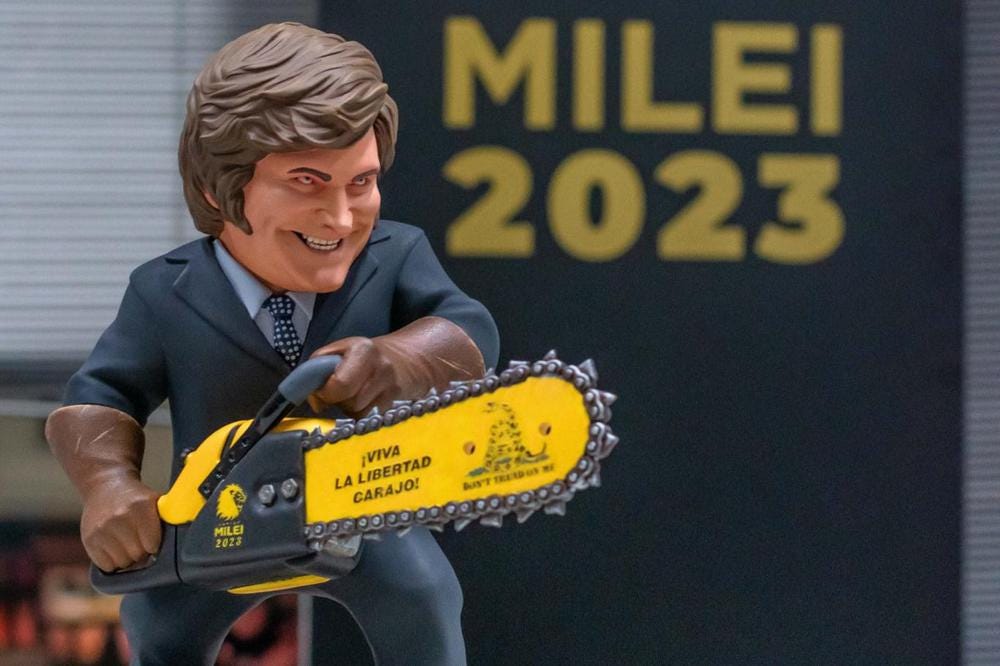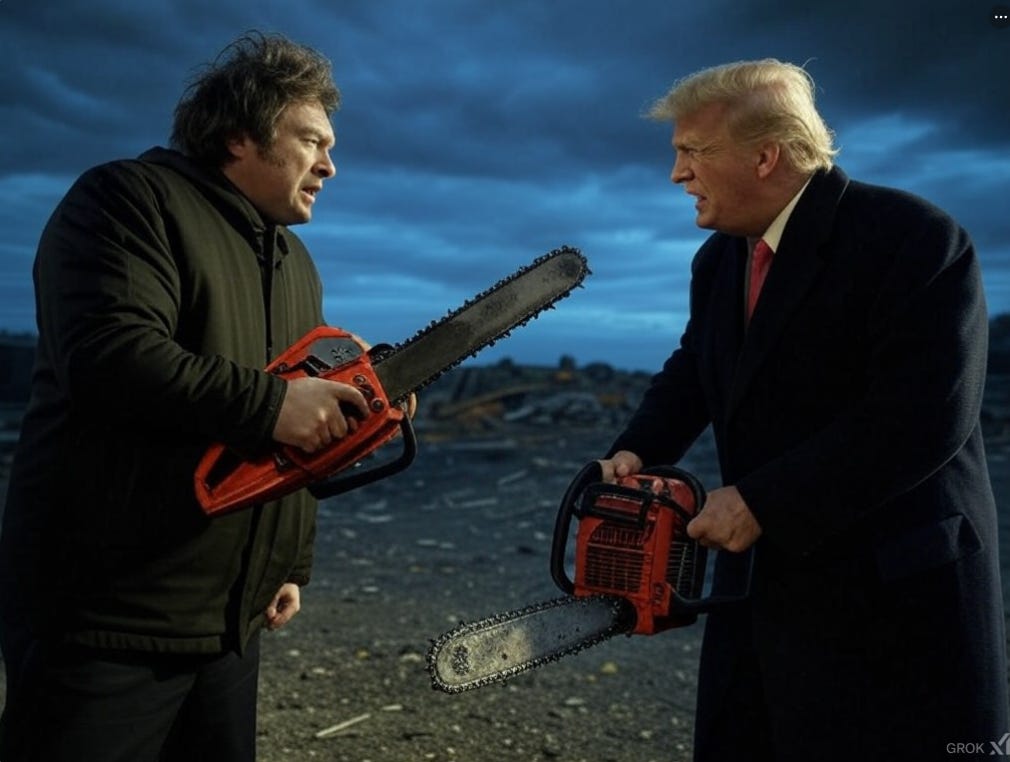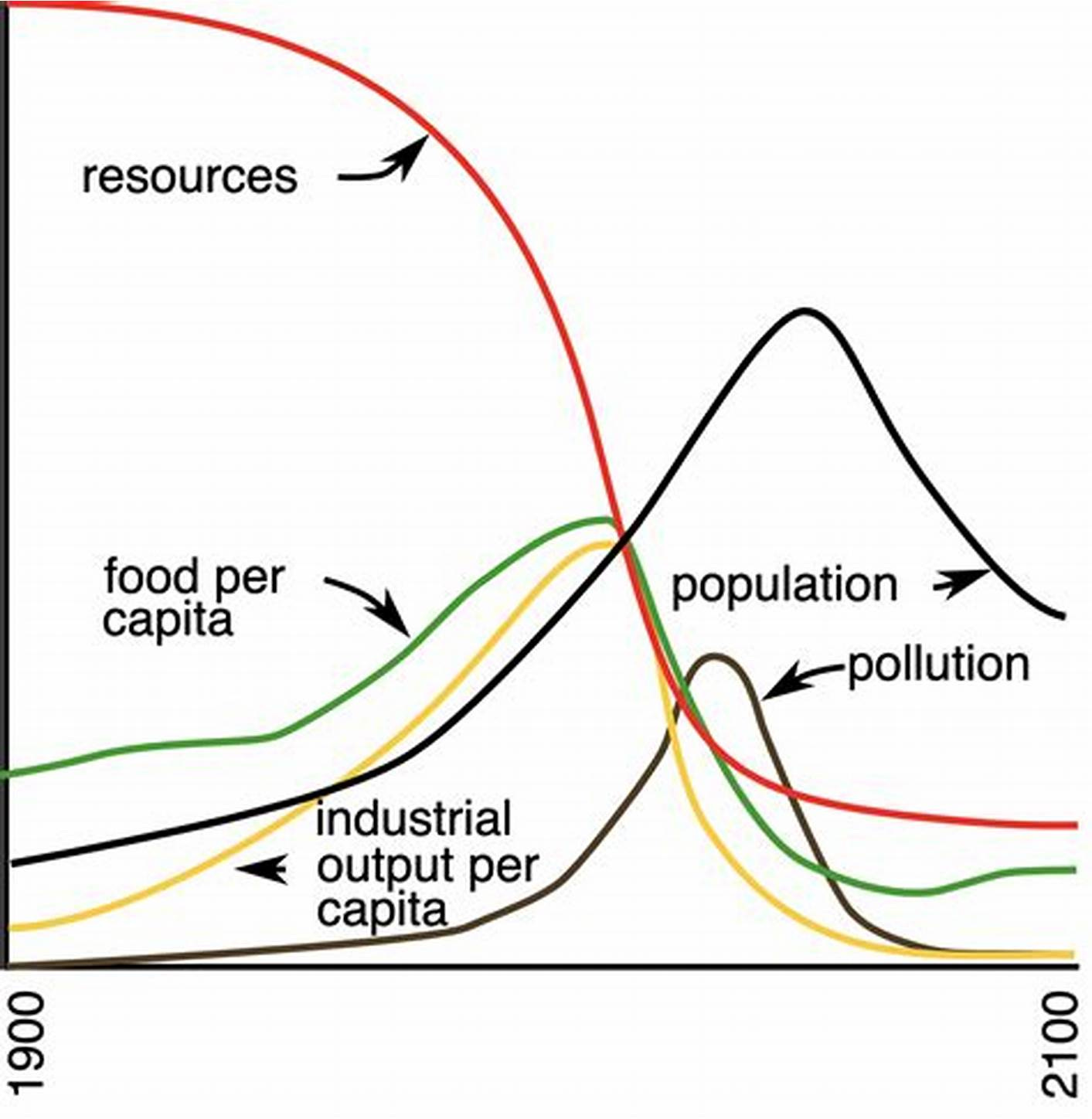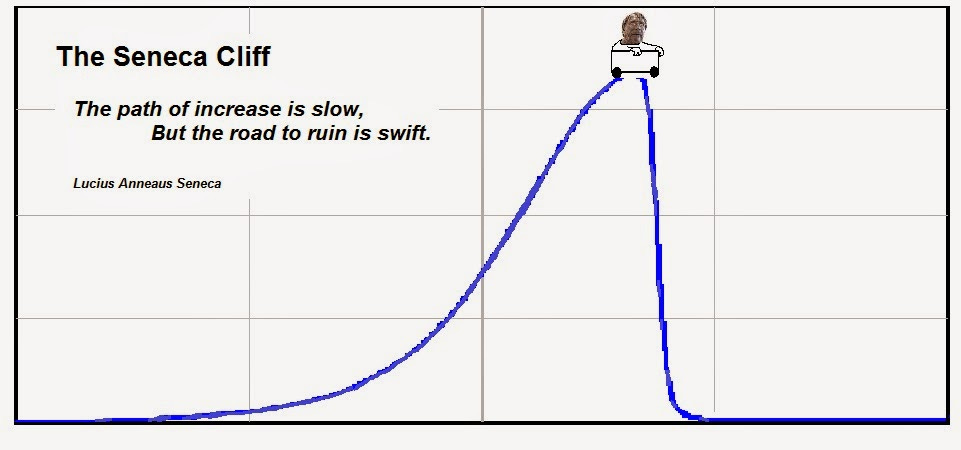The Imp with a Chainsaw
Donald Trump and Xavier Milei have several points in common, and a System Dynamics Analysis can explain their actions
Xavier Milei: an imp with a chainsaw as president of Argentina. Just like Donald Trump, Milei is a curious entity which, however, has reasons to exist. It is not casual that more than once Milei targeted the Club of Rome as an enemy in his speech: his ideas can be best understood in view of the scenarios of “The Limits to Growth” report.
Politics is a weird matter; it has always been so, but nowadays it has become even weirder. Starting from when Donald Rumsfeld (or someone of his entourage) pronounced the immortal words, “Now we create our own reality,” politics has become more and more detached from the real world. The latest weird event has been the emergence of an imp armed with a chainsaw who managed to become president of Argentina. He promised Argentinians that they would live better by dismantling the very structures that protect them, at least in part, from poverty and provide a minimum security and health care. The poor Argentinians voted for Milei en masse. Americans also voted for Trump who made them similar promises. Such is the power of propaganda.
It looks weird, but for everything which exists there are reasons for it to exist. Milei and Trump are similar reactions to the perception of the problems that plague society, and an attempt to solve them, usually worsening it. Unfortunately, it is a fact that people are very poor at solving complex problems. Let me start by citing the basic law of human behavior as it was proposed years ago by James R. Schlesinger
People have only two modes of operation: complacency and panic
From this broad statement, there follow the three laws of planning
Planning can only be done while in panic.
Planning can never be for the long term.
Planning usually worsens the problem.
These rules can also be expressed as “improvising can do a lot of damage, but to really fuck things up beyond all recognition takes planning.”
It means that it takes time for people to understand that something is badly wrong with the system. When they do, they’ll switch to panic and hastily put together something they think will solve the problem, creating a lot of damage in the process and usually making things worse. Let’s go back to the “Grand Blueprint for Civilization Demise” that was produced by a group of researchers supported by the Club of Rome in 1972 under the name of “The Limits to Growth” report.
I call it a blueprint because it told people what was going to happen if society continued operating in search of the maximum possible profit. It was not an unavoidable destiny: when this diagram was presented in 1972, the collapse was still far away in the future, and several actions to avoid it were still possible. Reducing economic growth, putting limits on resource exploitation, controlling birth rates, and the like would have eased the pressure on resources and limited pollution. But Schlesinger’s law made these ideas impossible. People were in a state of complacency and just couldn’t see the need to change anything in a world that looked like the best possible one. The world did follow the scenario of the “Limits to Growth” as if it were, indeed, a blueprint.
Nowadays, the problems sketched in 1972 are starting to become evident, and people are moving into “panic mode.” They understand that something has to be done, but what? And how?
One point that the Limits to Growth made was that the system was limited by the finite amount of resources available but, on the other side of the problem, there was pollution as a further element damaging the system. Pollution is, actually, the factor needed to transform a gradual decline into a full-fledged “Seneca Collapse.” Not only the world’s economy is slowed down by a gradually more expensive supply of resources, but it is also pulled down by the products of its activity, pollution, which need expensive actions to be controlled and limited. These two factors, depletion and pollution, gang together to take down the whole shebang. Seneca rules!
In terms of depletion, panic has already set in, leading to disastrous mistakes such as investing huge amounts of resources to exploit “shale” or “tight” oil. A classic example of a solution that worsen the problem, it only postponed the decline of oil production while causing enormous pollution problems. But where panic is starting to appear now is with pollution in its various forms, including climate change.
The powers that be are starting to understand that climate change is an enormous problem. They are not yet in full panic mode (and woe betide us when they will!), but are reacting in the simplest way they can: ignore the problem; maybe it will disappear by itself. The same is true for all the problems that plague us nowadays.
And here comes Milei with his chainsaw. He is not the first to float the idea that less government is good government. He was preceded by Ronald Reagan in the US, and he goes in parallel with the Trump administration. He is a colorful incarnation of the series of ideas that go with such names as “paleo-libertarianism,” “anarcho-capitalism,” “minarchism” and similar stuff. It is a set of ideas originating from the liberalism of the 19th century, expressed sometimes as “the high tide lifts all the boats.” Or, also, “if you feed the poor, they will reproduce and you’ll just have more poor to feed.”
In a certain sense, Milei, just like Trump, is a logic response to the situation. If pollution is a cost, we don’t want to pay for it, and one way to do that is by ignoring it. That implies cutting out the structures that were created to measure pollution and fight it. Milei’s aim is to destroy the bureaucracy of the state, and even the state itself, seen as a criminal organization that must be destroyed from within. Trump and his followers more than once mentioned the idea of “defunding climate science,” a surefire way to make the climate problem vanish.
These ideas find some resonance in system dynamics. The theory is that a complex system left to itself will explore its “parameter space” and eventually find a stability; a condition called “homeostasis.”
Complex systems often behave like that but the process is not painless. Applied to human society, it means that, for instance, the poor will die out, and will cease being a problem. Pollution, too, will increase so much that it will destroy the processes that create it and cease being a problem. And if resource depletion is a problem, then depletion itself will fix it: when nothing is left of it, you can’t deplete it anymore. Ultimately, if humans go extinct because of the collapse of the ecosystem, then this is the ultimate anarcho-capitalist solution to the problems that humans created.
But, at least, Milei, Trump, and others are identifying a real problem: bureaucracy IS a form of pollution. Several years ago, Joseph Tainter proposed the concept of “diminishing returns to complexity.” It is a way to state that a society may become so complex that it may get destroyed by the weight of its own bureaucracy. So, reducing bureaucracy is a way to free some resources that can be put into good use; at least in principle. But no complex society we know of has ever existed without laws and rules. Some form of bureaucracy is indispensable to manage and enforce the rules.
So, we need a leaner and more efficient bureaucracy and, likely, a chainsaw is not the best way to obtain that. A little more finesse is in order and, who knows? It might be done. Just might….









Yes, it's quite possible that Milei, and Trump for that matter, have been reading Tainter's Collapse of Complex Societies. Or somehow reached the same general conclusions.
That is, if a system is not sustainable anymore and is collapsing under its own weight, there is only one option that can prevent utter collapse. This is to drastically downsize and simply it. Whatever the cost. Because it will always be cheaper than collapse itself.
And so it happens that, after decade of economic failure and hyper-inflation in Argentina, Milei is downsizing the whole state apparatus. Telling to his people this going to be costly but it is the only option.
In the mean time, Trump not only tasked Musk to do the same in Washington but also realised the days of the global American empire are now counted. And it's time to leave the fringes to fend for themselves and to refocus on the core of the Empire. That is Northern America, from Panama to Groenland.
In essence that is basic idea of libertarianism. If you remove social safety nets you not only save on bureaucracy but you hope that it will cause poor people to die, hence you achieve further reduction in expenses. This reasoning is wrong. Poor people are incredibly resilient and tend to riot and kill rich people. This strategy is self defeating for rich people. It will only take short period of time for poor Argentinians to grasp that voting for Milei was mistake.